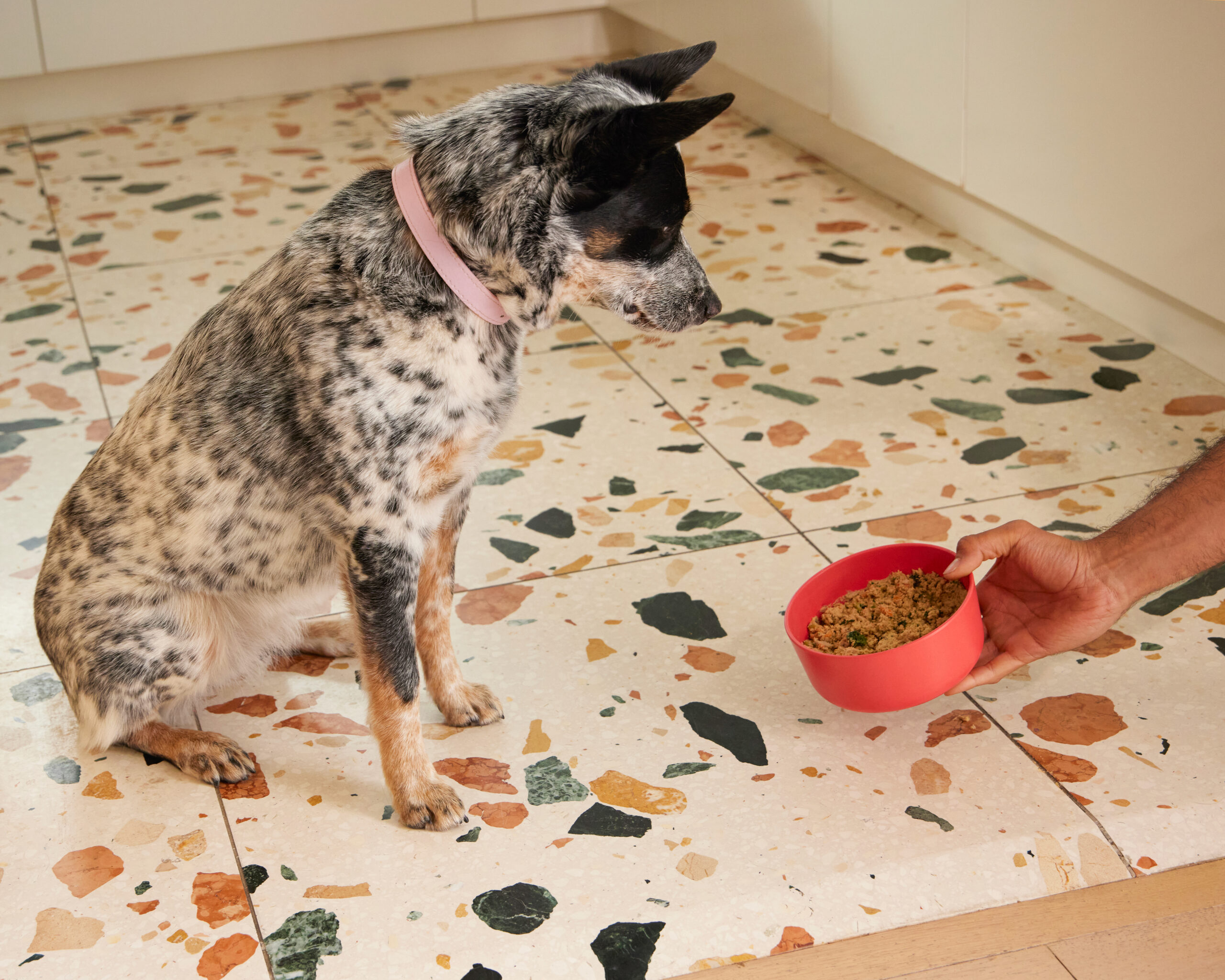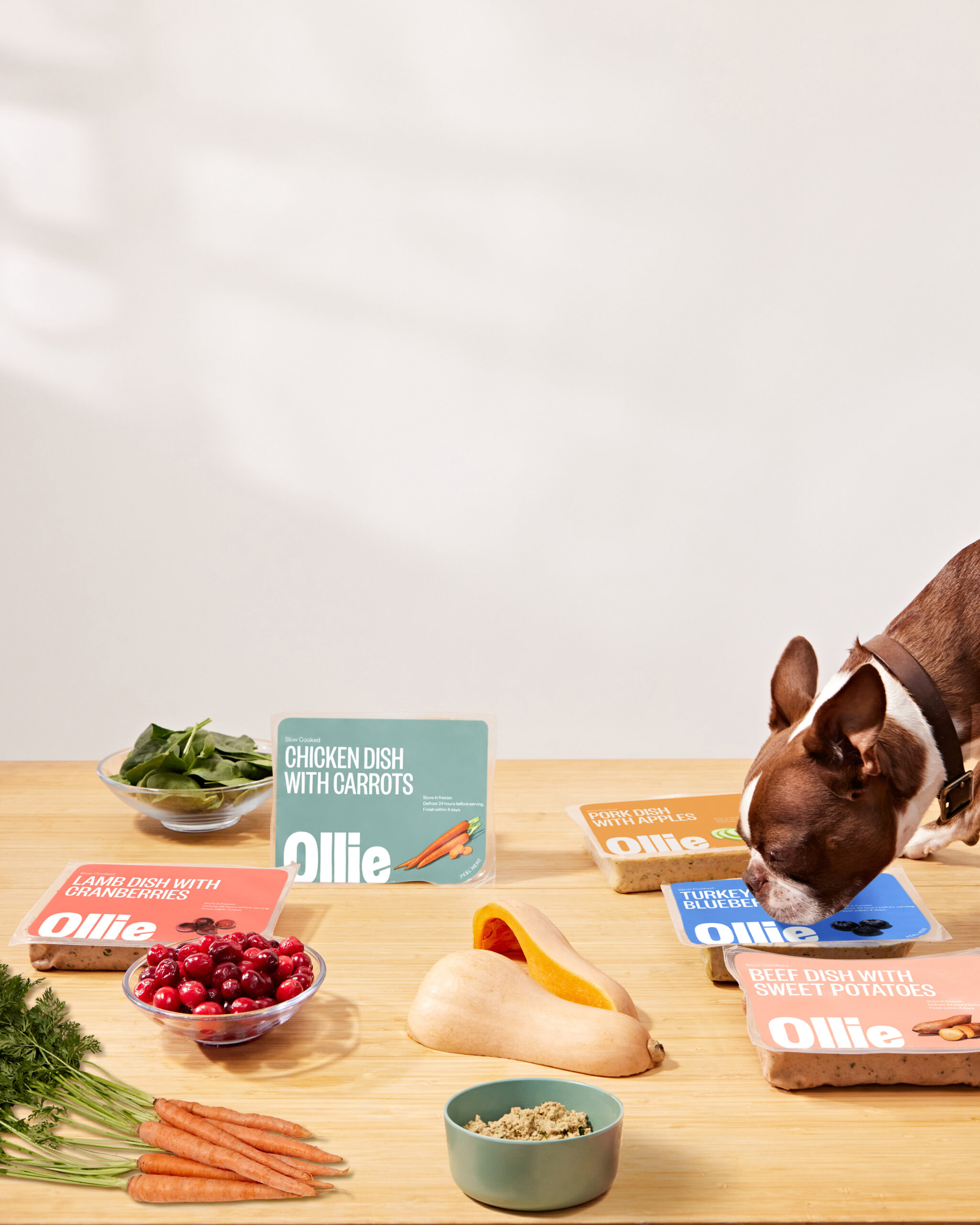Hey Ollie blog readers! We’re offering you an exclusive 60% OFF your starter box! Try now!
Food allergies and sensitivities can significantly impact your dog’s quality of life, causing discomfort and health concerns that require thoughtful dietary management. As pet parents who want the best for their canine companions, understanding these challenges and exploring new nutrition options can make all the difference. Read on for the full scoop.
Understanding Food Allergies in Dogs
Food allergies occur when your dog’s immune system overreacts to certain ingredients in their diet. Unlike food intolerances, which primarily affect the digestive system, true food allergies trigger immune responses that can manifest in various ways.

Common Signs of Food Allergies
The symptoms of food allergies in dogs can be frustrating to identify because they often mimic other conditions. Watch for these indicators:
- Persistent itching, especially around the face, paws, and ears
- Recurring ear infections or inflammation
- Gastrointestinal issues including vomiting or diarrhea
- Skin problems such as rashes, hives, or hot spots
- Chronic paw licking or chewing
These symptoms can significantly impact your dog’s comfort and wellbeing, making proper diagnosis and treatment essential.
The Most Common Food Allergens
While dogs can develop allergies to virtually any food ingredient, certain proteins tend to be more problematic than others. The most frequent offenders include:
- Beef
- Dairy products
- Chicken
- Lamb
- Fish
- Eggs
- Wheat and grains
- Soy
Interestingly, many dogs develop allergies to proteins they’ve been exposed to for long periods, which is why rotating protein sources can sometimes be beneficial as a preventative measure.
Diagnosing Food Allergies in Your Dog
Identifying the specific ingredients causing your dog’s allergic reactions requires patience and methodical testing. The gold standard for diagnosis remains the elimination diet trial.
The Elimination Diet Process
An elimination diet involves feeding your dog a novel protein and carbohydrate source—ingredients they haven’t been exposed to before—for 8-12 weeks. During this period, all other foods, treats, and flavored medications must be strictly avoided to prevent contamination of the trial.
“Because it can take 8 to 12 weeks before itching associated with food allergies improve, your veterinarian may recommend anti-itch treatments to help keep your pet comfortable while we work to figure out if your pet has a food allergy”[1]. This extended timeframe is necessary because food allergens can remain in your dog’s system for weeks after elimination.

Working With Your Veterinarian
Professional guidance is crucial when navigating food allergies. Your veterinarian might recommend:
- Blood tests to rule out other conditions
- Skin testing for environmental allergies
- Prescription hypoallergenic diets for the elimination phase
- Medications to manage symptoms during diagnosis
Remember that over-the-counter “limited ingredient” diets may not be truly limited or may contain traces of other ingredients due to manufacturing processes, potentially compromising your elimination trial.
Treatment Options for Food Allergies
The primary treatment for food allergies is straightforward but requires commitment: complete avoidance of the offending ingredients. “The only treatment is avoidance. Some dogs will require medication during severe episodes, but most pets can be successfully treated with a hypoallergenic diet”[2].
Medication Management
While dietary changes form the foundation of treatment, medications can help manage symptoms, especially during the diagnostic phase or severe flare-ups:
Anti-Itch Medications Several prescription options can provide relief while you work to identify and eliminate allergens:
- Cytopoint (Lokivetmab): A monoclonal antibody that blocks itch signals, providing relief for several weeks per injection[1].
- Apoquel (Oclacitinib): A medication that quickly blocks itching for up to 24 hours by inhibiting certain immune messengers[1].
- Atopica (Cyclosporine): Targets white blood cells to reduce immune responses involved in allergic reactions[1].
Corticosteroids In severe cases, your veterinarian might prescribe corticosteroids like prednisone, though these carry more significant side effects and are typically used short-term[1].
Long-Term Dietary Management
Once you’ve identified the problematic ingredients, you have several approaches to managing your dog’s diet:
- Commercial hypoallergenic diets with hydrolyzed proteins
- Limited-ingredient diets featuring novel proteins
- Home-prepared meals under veterinary guidance
- Fresh, personalized nutrition plans with carefully selected ingredients
The key is consistency and vigilance in avoiding exposure to allergens, which extends to treats, table scraps, and even flavored medications.

Fresh Food Solutions: A Modern Approach to Allergy Management
Fresh, minimally processed dog food represents a significant advancement in managing food sensitivities and allergies. These diets offer several advantages over traditional commercial options.
Benefits of Fresh Food for Allergic Dogs
Fresh food diets provide unique benefits that can be particularly valuable for dogs with food sensitivities:
- Ingredient Transparency: With fresh food, you know exactly what your dog is eating, making it easier to avoid specific allergens.
- Limited Processing: Minimal processing preserves nutritional integrity and reduces the risk of cross-contamination.
- Customization Options: Many fresh food services can tailor recipes to exclude specific ingredients based on your dog’s needs.
- Higher Digestibility: Fresh ingredients are often easier for sensitive dogs to digest, potentially reducing gastrointestinal symptoms.
How Ollie Addresses Dietary Challenges
At Ollie, we understand that each dog has unique nutritional needs, especially those with food sensitivities. Our approach centers on personalization, quality ingredients, and nutritional expertise. We create customized meal plans based on your dog’s specific profile, including any known food sensitivities or allergies. Each recipe is formulated by veterinary nutritionists using human-grade ingredients, with options that exclude common allergens like chicken or beef. Our transparent ingredient lists make it easy to identify and avoid problematic foods, while our careful preparation methods minimize the risk of cross-contamination that can occur in conventional pet food manufacturing.

Transitioning to a New Diet
When introducing a new diet to address food allergies, a careful transition is essential to prevent digestive upset and accurately assess the diet’s effectiveness.
Gradual Introduction
For most dietary changes, a 7-10 day transition period is recommended:
- Days 1-3: 75% old food, 25% new food
- Days 4-6: 50% old food, 50% new food
- Days 7-10: 25% old food, 75% new food
- Day 11 onward: 100% new food However, when addressing food allergies, your veterinarian might recommend a different approach, sometimes involving an immediate switch to the new diet to begin the elimination trial promptly.
Monitoring Progress
Keep a detailed journal during the transition and beyond, noting:
- Any changes in symptoms (positive or negative)
- Stool quality and frequency
- Energy levels and behavior
- Skin and coat condition
This information will be invaluable in determining whether the new diet is addressing your dog’s specific needs or if further adjustments are necessary.
Beyond Diet: Comprehensive Allergy Management
While diet forms the cornerstone of food allergy management, a holistic approach can enhance your dog’s overall wellbeing and potentially reduce symptom severity.
Supporting Skin Health
Dogs with food allergies often have compromised skin barriers, making them more susceptible to irritation and secondary infections. Consider these supportive measures:
- Regular bathing with gentle, veterinarian-recommended shampoos
- Omega-3 fatty acid supplementation (if approved by your veterinarian)
- Avoiding environmental irritants like harsh cleaning products
- Maintaining proper humidity levels in your home
Gut Health Optimization
Emerging research suggests connections between gut health and allergic conditions. Supporting your dog’s digestive system may complement dietary management:
- Probiotic supplements designed specifically for dogs (with veterinary approval)
- Prebiotic fibers that nourish beneficial gut bacteria
- Stress reduction, as anxiety can impact digestive function
Remember that any supplements should be discussed with your veterinarian to ensure they won’t interfere with your dog’s allergy management plan.
When to Seek Additional Help
Managing food allergies is often an ongoing process that requires adjustments over time. Certain situations warrant prompt veterinary attention:
- Symptoms persist despite strict adherence to the elimination diet
- New symptoms develop during the trial period
- Your dog refuses to eat the prescribed diet
- Weight loss occurs during dietary management
- Secondary skin infections develop
“Dog food allergies/intolerances cannot be cured, but they can be well-managed long term with appropriate diet therapy and avoidance of offending ingredients”[3]. This ongoing management approach means maintaining open communication with your veterinary team.
Conclusion
Navigating food allergies in dogs requires patience, consistency, and a personalized approach. While the process of diagnosis and management can be challenging, the improvement in your dog’s comfort and quality of life makes these efforts worth it.
Fresh, customized nutrition plans offer promising solutions for dogs with dietary sensitivities, providing the transparency and flexibility needed to avoid allergens while ensuring complete nutrition. By working closely with your vet and considering services like Ollie that offer a variety of allergy-friendly recipes, you can develop an effective strategy for addressing your dog’s unique dietary challenges.
Remember that food allergy management is a journey rather than a destination—one that may require periodic reassessment and adjustment as your dog’s needs evolve. With the right approach and support, you can help your canine companion thrive despite these dietary challenges.
Citations
[1] https://veterinaryskinandear.com/food-allergies-in-dogs/
[2] https://vcahospitals.com/know-your-pet/food-allergies-in-dogs
[3] https://www.petmd.com/dog/conditions/digestive/food-allergies-dogs
Tagged As:

The nutrition your dog needs,
the food they want.

Enjoying our articles? Subscribe our Newsletters and get new articles directly to your inbox
You might also like
4 June 2025
7 MINS READ
Feed Their Future: Why Human-Grade Food Matters for Puppies
Among the many decisions you’ll make as a new pet parent, choosing the right food for your growing puppy is one of the most important. The quality of your puppy’s diet can impact their developme…
by Ollie Pets
4 June 2025
6 MINS READ
How Does Fresh Dog Food Compare to Homemade?
As pet parents become more conscious about what goes into their dog’s food bowl, many are considering alternatives to traditional kibble. Two increasingly popular options are fresh dog food and ho…
by Ollie Pets
4 June 2025
5 MINS READ
How Can Fresh Dog Food Help with Weight Management?
Maintaining a healthy weight is one of the most important aspects of your dog’s overall health and longevity. Being overweight or underweight can result in health complications and conditions that…
by Ollie Pets







